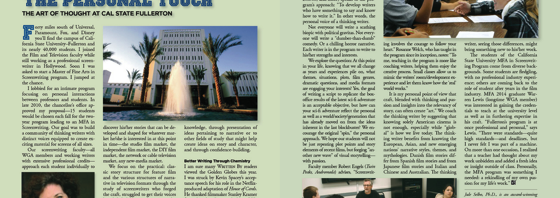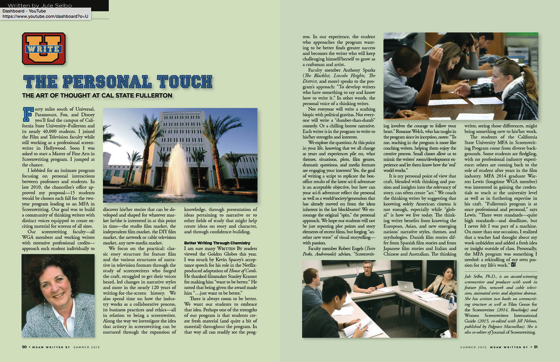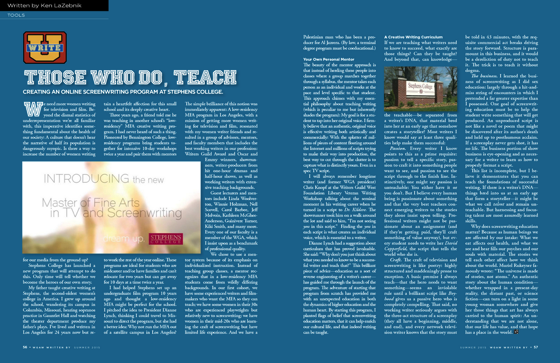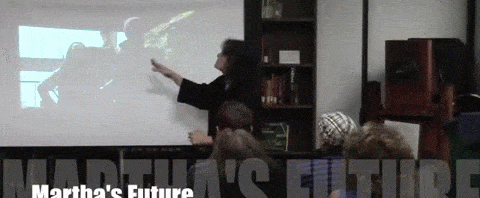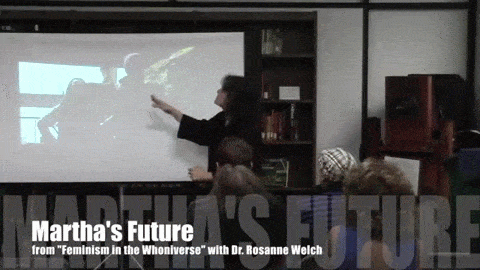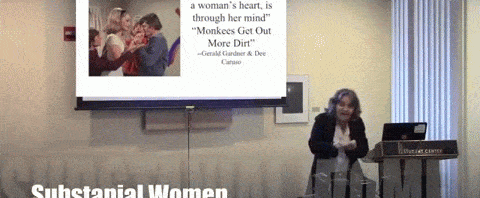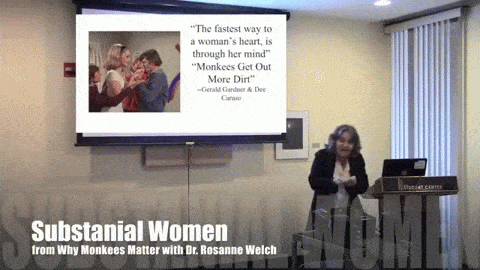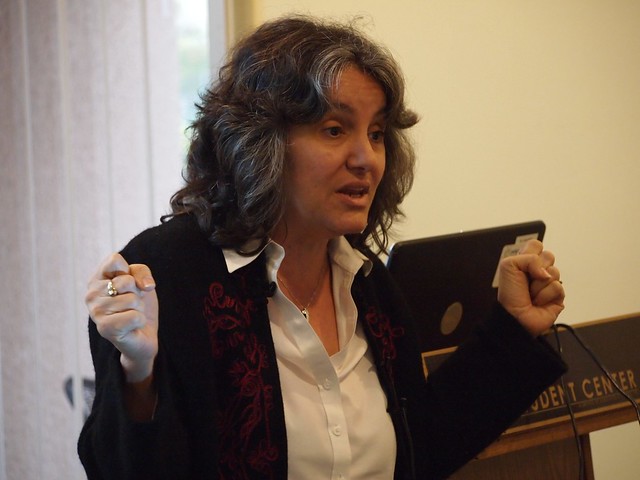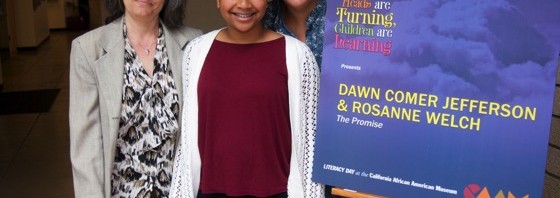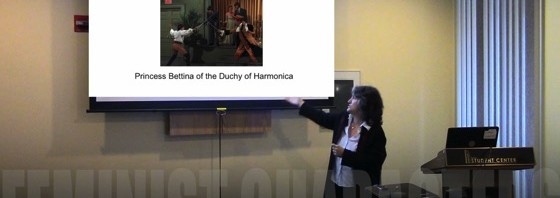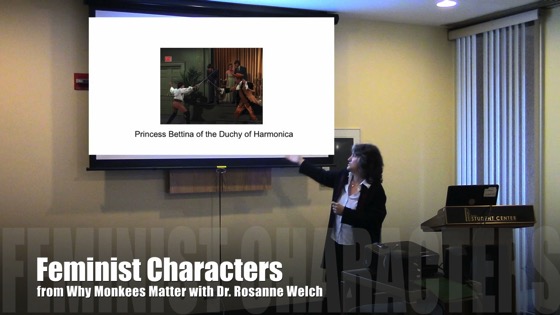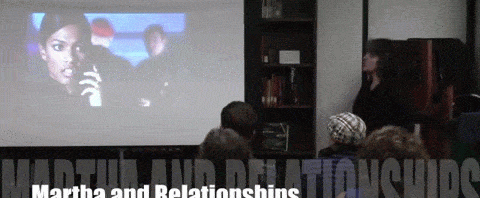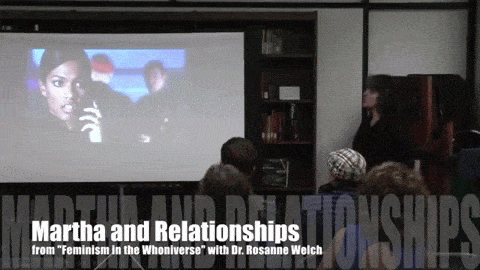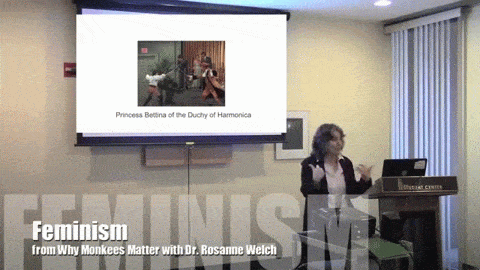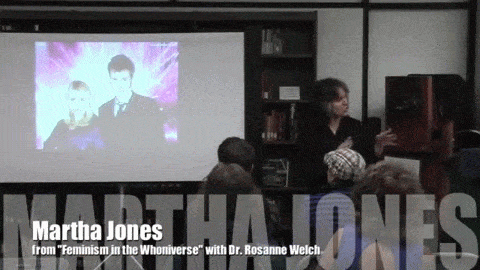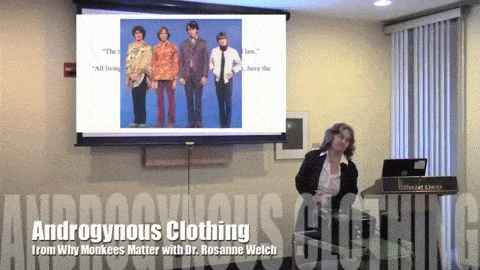Check out page 50-51 for a marvelous piece by my friend Jule Selbo about the MFA in Screenwriting she created for Cal State Fullerton! And page 56-57 for the great piece by other friend Ken Lazebnik on the new Stephens College MFA in Screenwriting! Each of the directors of these two programs care deeply about their students — and about the quality of the craft — so it’s a pleasure working with them! (And read the rest of the issue because it has a great piece on the writers behind GRIMM which really takes you inside the creative brain as it conjures up a new world of characters worth visiting each week!)
Category: Education
Video: Martha’s Future from Doctor Who: Feminism in the Whoniverse with Dr. Rosanne Welch
A clip from this longer presentation – Doctor Who: Feminism in the Whoniverse with Dr. Rosanne Welch
Watch this entire presentation – Doctor Who: Feminism in the Whoniverse with Dr. Rosanne Welch
Dr. Rosanne Welch (https://rosannewelch.com) speaks on “Feminism in the Whoniverse” of Doctor Who, the BBC television program now in its 50th year. She reviews each of the Doctor’s female companions and speaks on how they are represented in the program and how they represented the women of their respective periods.
Transcript:
I happen to think it’s an excellent ending for Martha because she didn’t get the first man she wanted, but she found another one of equal value that she could build a life with and, in fact, they grow up to be rogue alien hunters. So, she’s still doing exactly what she did, so losing the man didn’t force her to lose the job that she had with that man. She re-built it with somebody else. To me, that’s very strong.
Feminism in the Whoniverse was presented at the Cal Poly Pomona University Library where Dr. Welch teaches in the IGE (Interdisciplinary General Education) program.
This is the 4th talk on various aspects of Doctor Who that Dr. Welch has presented. You can find these talks using the links below.
- Doctor Who and Culture
- Doctor Who Regenerated
- “How the Growing Popularity of the English Who-niverse Effected American TV” with Dr. Rosanne Welch
Subscribe to Dr. Welch’s YouTube Channel
Podcast: Play in new window | Download
Subscribe: RSS
Video: Substantial Women from “Why Monkees Matter” with Dr. Rosanne Welch
Dr. Rosanne Welch presents Why Monkees Matter: How The Writing Staff of The Monkees Brought the 1960s Counter Culture to Mainstream Pre-Teen Viewers at the 2014 Cal Poly Pomona Provost’s Symposium on Faculty Scholarship (http://www.cpp.edu/~research/)
Transcript:
So, I learned as a child — think, or that’s what I posit — that if I wanted to marry a Monkee, I didn’t want to be popular. I wanted to be substantial. I wanted to be a woman of some meaning and that’s what would attract them. And I think that’s a really important message to give little girls. Not that I need to be gorgeous and have the perfect little outfit, right? So feminism is all through this thing.
View photos from this presentation
Description:
Based on a chapter in my upcoming book The Metatextual Menagerie that was The Monkees, which includes a series of interviews conducted with surviving writers and performers of the 1960s television program, The Monkees I will discuss how the writers and actors used the show as a platform for their own emerging counter culture/anti-war messages.
Worth studying for its craft and place in television history (the show won an Emmy as Best Comedy Of 1967) the program’s true importance may come from its impact on the politics and culture of the era. Considered innocuous by the network, thepress and the parents of the era, the storylines and jokes created by the writers and the actor’s ad-libs brought the emerging counter-culture to the attention of young teens whose parents might not have appreciated the message. Cultural icons such as Timothy Leary recognized the subversive nature of the program, seen through the writing and in choices made about costuming, hair length, musical guests (Frank Zappa, Tim Buckley, Charlie Smalls) and songs performed by the band brought issues of Vietnam, voting and civil rights to the ‘young generation’ for whom the show clearly had ‘somethin’to say.
Subscribe to Dr. Welch’s YouTube Channel
About the Symposium:
The 2014 Provost’s Symposium is a forum to learn about each other’s scholarly work, make new friends, renew old acquaintances, and enhance our appreciation of the rich and diverse array of professional endeavors pursued by the faculty at Cal Poly Pomona.
Podcast: Play in new window | Download
Subscribe: RSS
Video: Martha and Mickey from Doctor Who: Feminism in the Whoniverse with Dr. Rosanne Welch
A clip from this longer presentation – Doctor Who: Feminism in the Whoniverse with Dr. Rosanne Welch
Watch this entire presentation – Doctor Who: Feminism in the Whoniverse with Dr. Rosanne Welch
Dr. Rosanne Welch (https://rosannewelch.com) speaks on “Feminism in the Whoniverse” of Doctor Who, the BBC television program now in its 50th year. She reviews each of the Doctor’s female companions and speaks on how they are represented in the program and how they represented the women of their respective periods.
Transcript:
Now, this all became an interesting question. We see that she has married Mickey, who was once Rose’s boyfriend way back in the day. This happens because — production. When they filmed the episode that said goodbye to David Tennant, they wanted him to see all his previous friends, right, and they wanted them all to have a moment where they saw him before he regenerated. When tehy scheduled these two actors, both of them had other jobs in films. They had only one day in which to film their scene. it was the morning they were both free. So , how was he going to come up with a scene that involves them both. Being a writer he thought, “Wouldn’t it be fun it Smith and Jones got married.” So that’s what he did. He ended up getting some flack for that because there were people who though what he was saying was people of color always have to only marry each other. No, he was saying these two actors couldn’t show up any day but today. Ok? So you have to have a little understanding of those — the process of production.
Feminism in the Whoniverse was presented at the Cal Poly Pomona University Library where Dr. Welch teaches in the IGE (Interdisciplinary General Education) program.
This is the 4th talk on various aspects of Doctor Who that Dr. Welch has presented. You can find these talks using the links below.
- Doctor Who and Culture
- Doctor Who Regenerated
- “How the Growing Popularity of the English Who-niverse Effected American TV” with Dr. Rosanne Welch
Subscribe to Dr. Welch’s YouTube Channel
Podcast: Play in new window | Download
Subscribe: RSS
Photos: Dr. Rosanne Welch and Dawn Comer Jefferson at Heads Are Turning, Children Are Learning – California African-American Museum Celebrates Children’s Literacy
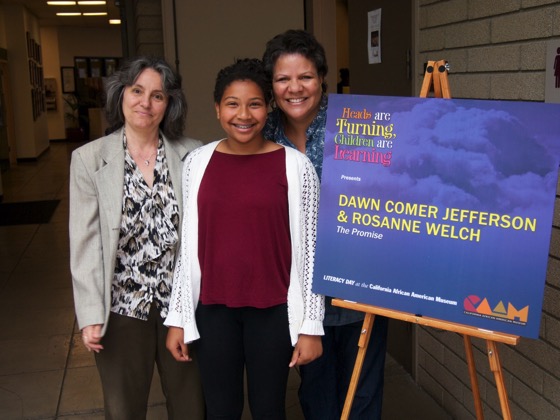
One Saturday March 23rd my co-author Dawn Comer Jefferson and I were invited to the California African American Museum (CAAM) for their annual literacy day, this year titled “Heads are Turning, Children are Learning”. We presented a workshop on African American on the Oregon Trail, based on the research we did for the story in our children’s book The Promise which involves an enslaved family taken on the Oregon Trail with the promise of freedom if they survive. Sadly, when they all arrive in Oregon, the owner frees the parents but not the children since he had never mentioned the children in their original deal.
About 20 children and parents attended the workshop and participated in an exercise where they wrote a letter back to family and friends about their experience on the Oregon Trail. It was fun to hear what parts of the presentation they remembered enough to include in their letters and to see them enjoy a chance to be creative.
Video: Feminist Characters from “Why Monkees Matter” with Dr. Rosanne Welch
Dr. Rosanne Welch presents Why Monkees Matter: How The Writing Staff of The Monkees Brought the 1960s Counter Culture to Mainstream Pre-Teen Viewers at the 2014 Cal Poly Pomona Provost’s Symposium on Faculty Scholarship (http://www.cpp.edu/~research/)
Transcript:
The very first woman that we met was the Princess of the Duchy of Harmonica. So, we’re being funny, but she was a princess who had the opportunity to marry Davy Jones — every girl’s dream in that period. She turned it down because she had a duty to her country to go home and be its ruler. If that’s not an empowered young woman — what a cool thing, right? And then just very imply Julie Newmar who you know as the Catwoman from Batman she guests on an episode where they all wanted her to fall in love with them and the line was, “The fastest way to a woman’s heart is through her mind.” Through her mind! And so each boy tries to do the things she claims to enjoy. Poetry, classical music, ballet, all these high end things, not some silly nonsense.
View photos from this presentation
Description:
Based on a chapter in my upcoming book The Metatextual Menagerie that was The Monkees, which includes a series of interviews conducted with surviving writers and performers of the 1960s television program, The Monkees I will discuss how the writers and actors used the show as a platform for their own emerging counter culture/anti-war messages.
Worth studying for its craft and place in television history (the show won an Emmy as Best Comedy Of 1967) the program’s true importance may come from its impact on the politics and culture of the era. Considered innocuous by the network, thepress and the parents of the era, the storylines and jokes created by the writers and the actor’s ad-libs brought the emerging counter-culture to the attention of young teens whose parents might not have appreciated the message. Cultural icons such as Timothy Leary recognized the subversive nature of the program, seen through the writing and in choices made about costuming, hair length, musical guests (Frank Zappa, Tim Buckley, Charlie Smalls) and songs performed by the band brought issues of Vietnam, voting and civil rights to the ‘young generation’ for whom the show clearly had ‘somethin’to say.
Subscribe to Dr. Welch’s YouTube Channel
About the Symposium:
The 2014 Provost’s Symposium is a forum to learn about each other’s scholarly work, make new friends, renew old acquaintances, and enhance our appreciation of the rich and diverse array of professional endeavors pursued by the faculty at Cal Poly Pomona.
Podcast: Play in new window | Download
Subscribe: RSS
Video: Martha and Relationships from Doctor Who: Feminism in the Whoniverse with Dr. Rosanne Welch
A clip from this longer presentation – Doctor Who: Feminism in the Whoniverse with Dr. Rosanne Welch
Watch this entire presentation – Doctor Who: Feminism in the Whoniverse with Dr. Rosanne Welch
Dr. Rosanne Welch (https://rosannewelch.com) speaks on “Feminism in the Whoniverse” of Doctor Who, the BBC television program now in its 50th year. She reviews each of the Doctor’s female companions and speaks on how they are represented in the program and how they represented the women of their respective periods.
Transcript:
Martha is cool enough, first of all, to travel with The Doctor. Second of all, she’s going to end up joining UNIT and being just like Liz Shaw, a female assistant through the military connection that he has — and that’s a pretty cool thing. And then, she’s going to end up married To Mickey. Now, this become an interesting question. She, following Rose, is the second person to fall in love with The Doctor. Now, we can’t have everyone do that or the show gets boring, so we know that they can’t end up together and he can’t all in love with her too because then he’s just sort of a wander Romeo and then we lose all respect for him. Ok? If the TARDIS is just like his purple couch, This is a bad thing. It changes the whole point of the show. So, we have to deal with Martha – who recognizes how she feels. Tells the boy how she feels about him — which is a very empowering thing to do. Gets told he can’t feel the same way and doesn’t fall apart. She does the thing that is best for her. She leaves him. She says “Goodbye” of her own choosing, so that she can continue her life. She does not make the mistake that Sarah Jane made 15 years ago. She is smarter and more together than that. So, I think she’s a pretty interesting character.
Feminism in the Whoniverse was presented at the Cal Poly Pomona University Library where Dr. Welch teaches in the IGE (Interdisciplinary General Education) program.
This is the 4th talk on various aspects of Doctor Who that Dr. Welch has presented. You can find these talks using the links below.
- Doctor Who and Culture
- Doctor Who Regenerated
- “How the Growing Popularity of the English Who-niverse Effected American TV” with Dr. Rosanne Welch
Subscribe to Dr. Welch’s YouTube Channel
Podcast: Play in new window | Download
Subscribe: RSS
Video: Feminism from “Why Monkees Matter” with Dr. Rosanne Welch
Dr. Rosanne Welch presents Why Monkees Matter: How The Writing Staff of The Monkees Brought the 1960s Counter Culture to Mainstream Pre-Teen Viewers at the 2014 Cal Poly Pomona Provost’s Symposium on Faculty Scholarship (http://www.cpp.edu/~research/)
Transcript:
Feminism is what struck me, because we’re all little girls watching this program and because of the way TV today. something that I — I do enjoy The Big Bang Theory, but really it’s a show about who’s going to have sex with which girl this week and that’s kind of what happens to females on TV sometimes these days. Because we had rules back in the day. Four musicians should be about that, too, and yet they weren’t. Every girl that they met on this program in 58 episodes had her own job, took care of herself, was going to school, cared about the culture, and the world, was involved insocial justice issues. Nobody was a cheerleader. Nobody was “Rah, Rah, Look at me! I’ma ditzy blonde and I have no brain.” They were all intelligent, interesting, young women.
View photos from this presentation
Description:
Based on a chapter in my upcoming book The Metatextual Menagerie that was The Monkees, which includes a series of interviews conducted with surviving writers and performers of the 1960s television program, The Monkees I will discuss how the writers and actors used the show as a platform for their own emerging counter culture/anti-war messages.
Worth studying for its craft and place in television history (the show won an Emmy as Best Comedy Of 1967) the program’s true importance may come from its impact on the politics and culture of the era. Considered innocuous by the network, thepress and the parents of the era, the storylines and jokes created by the writers and the actor’s ad-libs brought the emerging counter-culture to the attention of young teens whose parents might not have appreciated the message. Cultural icons such as Timothy Leary recognized the subversive nature of the program, seen through the writing and in choices made about costuming, hair length, musical guests (Frank Zappa, Tim Buckley, Charlie Smalls) and songs performed by the band brought issues of Vietnam, voting and civil rights to the ‘young generation’ for whom the show clearly had ‘somethin’to say.
Subscribe to Dr. Welch’s YouTube Channel
About the Symposium:
The 2014 Provost’s Symposium is a forum to learn about each other’s scholarly work, make new friends, renew old acquaintances, and enhance our appreciation of the rich and diverse array of professional endeavors pursued by the faculty at Cal Poly Pomona.
Podcast: Play in new window | Download
Subscribe: RSS
Video: Martha Jones from Doctor Who: Feminism in the Whoniverse with Dr. Rosanne Welch
A clip from this longer presentation – Doctor Who: Feminism in the Whoniverse with Dr. Rosanne Welch
Watch this entire presentation – Doctor Who: Feminism in the Whoniverse with Dr. Rosanne Welch
Dr. Rosanne Welch (https://rosannewelch.com) speaks on “Feminism in the Whoniverse” of Doctor Who, the BBC television program now in its 50th year. She reviews each of the Doctor’s female companions and speaks on how they are represented in the program and how they represented the women of their respective periods.
Transcript:
Rose is an interesting character, so there are those that say, “Yes, she’s a feminist character” and then those that say, “eh. She’s not very smart.” So, what qualifies. She has made choices in her life and the choices, in my opinion, are what qualify. She is followed by Martha Jones. The very first companion of color, which is a very big thing for Doctor Who and also, what’s her job, before she travels? She’s an actual doctor. Which, I think is the loveliest job we have given any of The Doctor’s companions. Somebody who is equally intellectually his match. No question about it. Not only do I do test-tubey things at Cambridge, I fix bodies. And, in later episodes we’ll talk about The Doctor as a healer. So she is the ultimate healer and she’s a female and a female of color. Right? She has bucked the system that doesn’t always assist both women and people of color to attain these types of heights, if you will.
Feminism in the Whoniverse was presented at the Cal Poly Pomona University Library where Dr. Welch teaches in the IGE (Interdisciplinary General Education) program.
This is the 4th talk on various aspects of Doctor Who that Dr. Welch has presented. You can find these talks using the links below.
- Doctor Who and Culture
- Doctor Who Regenerated
- “How the Growing Popularity of the English Who-niverse Effected American TV” with Dr. Rosanne Welch
Subscribe to Dr. Welch’s YouTube Channel
Podcast: Play in new window | Download
Subscribe: RSS
Video: Androgynous Clothing from “Why Monkees Matter” with Dr. Rosanne Welch
Dr. Rosanne Welch presents Why Monkees Matter: How The Writing Staff of The Monkees Brought the 1960s Counter Culture to Mainstream Pre-Teen Viewers at the 2014 Cal Poly Pomona Provost’s Symposium on Faculty Scholarship (http://www.cpp.edu/~research/)
Transcript:
This is my androgynous clothing slide, just to cover that for a moment. The poncho. The colors. I mean how could you do that? This is in their second season. In their first season they appeared like that. Much more 50’s-ish verging on early 60’s. A little Frankie Valli thing going on. So look at the change that was brought to their viewers in just one season where you could see truly the Hippie Culture in its clothing.
View photos from this presentation
Description:
Based on a chapter in my upcoming book The Metatextual Menagerie that was The Monkees, which includes a series of interviews conducted with surviving writers and performers of the 1960s television program, The Monkees I will discuss how the writers and actors used the show as a platform for their own emerging counter culture/anti-war messages.
Worth studying for its craft and place in television history (the show won an Emmy as Best Comedy Of 1967) the program’s true importance may come from its impact on the politics and culture of the era. Considered innocuous by the network, thepress and the parents of the era, the storylines and jokes created by the writers and the actor’s ad-libs brought the emerging counter-culture to the attention of young teens whose parents might not have appreciated the message. Cultural icons such as Timothy Leary recognized the subversive nature of the program, seen through the writing and in choices made about costuming, hair length, musical guests (Frank Zappa, Tim Buckley, Charlie Smalls) and songs performed by the band brought issues of Vietnam, voting and civil rights to the ‘young generation’ for whom the show clearly had ‘somethin’to say.
Subscribe to Dr. Welch’s YouTube Channel
About the Symposium:
The 2014 Provost’s Symposium is a forum to learn about each other’s scholarly work, make new friends, renew old acquaintances, and enhance our appreciation of the rich and diverse array of professional endeavors pursued by the faculty at Cal Poly Pomona.
Podcast: Play in new window | Download
Subscribe: RSS
